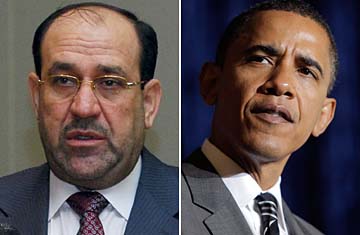
Iraqi Prime Minister Nouri al-Maliki and Barack Obama.
As Barack Obama gets set to visit Iraq this week as part of a high-profile tour of Europe and the Middle East, Iraq seems unsure of just how to receive him. "Obama is a well-liked person. You feel it when he talks because he's genuine and passionate about what he says — he's not acting," says supermarket attendant Bassam Obeid in central Baghdad. "But this visit is just for election publicity, and 16 months [for U.S. combat troop withdrawal] is an exaggeration." Leila Mohammed, a housewife in Baghdad's Karrada district, also shrugged at the significance of the visit, the first Obama will make to the war zone since clinching the Democratic nomination. "There is no need for Obama to meet [Iraq's Prime Minister] Nouri al-Maliki until after he has been elected," she said.
Obeid and Mohammed aren't the only ones who feel that way. Maliki also appears uncertain of just how warmly to welcome the Democratic candidate at this stage in the U.S. presidential campaign. Despite the Iraqi leader's recent call for a timetable for U.S. troop withdrawal — not a far cry from Obama's pledge to withdraw all combat troops within 16 months of being elected — it remains unclear whether Obama and Maliki will even meet this week.
On Saturday, the Prime Minister jolted Washington when a German magazine, Der Spiegel, published comments from an interview in which he seemed to back the Democratic candidate's call for a 16-month timetable. Der Spiegel quoted Maliki as saying "U.S. presidential candidate Barack Obama talks about 16 months. That, we think, would be the right time frame for a withdrawal, with the possibility of slight changes." But the comments came a day after Maliki and the White House agreed more vaguely to negotiate a "time horizon" for a continued U.S. troop presence in the country, and Sunday saw the Prime Minister quickly back-pedaling. Iraqi government spokesman Ali al-Dabbagh said that Maliki had been misquoted.
The White House, which has been in talks with the Iraqi government over the long-term Status of Forces Agreement, and Republican candidate John McCain have long stressed their opposition to a specific timetable, arguing that it gives insurgent groups an advantage. In recent days, though, as Maliki has become more candid about his desire for a withdrawal, both the Bush Administration and McCain have signaled an (albeit reluctant) acceptance that the U.S. departure will come years sooner rather than decades later. Many Iraqis, however, think they should stick with their original positions: "It's too early to withdraw because security is not fully established yet. I'm a refugee from Amariya [a Sunni insurgent stronghold in Baghdad] and I can't go back there yet," says Leila Mohammed.
Dabbagh also emphasized that Maliki would not be backing any specific candidate. Indeed, it would be a politically charged move for the Prime Minister to meet with Obama on his first visit to Iraq as a presidential candidate; he has yet to meet with Obama's opponent, John McCain, and meeting with one candidate might signal an endorsement. "Of course Maliki will avoid endorsing any candidate because the Republicans are currently in power and he is working with them," says Saadun Abbas, a 42-year-old Iraqi government employee. "But [I think] he will definitely agree to meet with Obama because he needs to see Obama's vision for Iraq's future should he get elected."
Some Iraqi politicians have welcomed the visit as an opportunity, regardless of whether Obama wins in November. "I think it's a very important visit," Kurdish MP Tanya Gilly told TIME. "As a Senator he should see the situation on the ground so that he can better understand [Iraq]." Sunni MP Ayad al-Samarai of the National Accordance Front says: "It will be good for him to get to know each leader, hear their thoughts and see how each side is thinking."
"Obama would be a huge win for the Arabs," says government bureaucrat Saadun Abbas, smiling. "If he was coming here as President, then of course this visit would help [Iraq] a lot. But any visit [he makes] as a candidate is just for campaign publicity."
— With reporting by Mazin Ezzat / Baghdad
